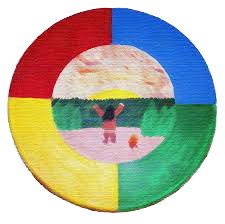How We Work
In generating a collective script for performance with the Stardale girls, perhaps the most delicate part is creating a comfortable and safe environment where they feel they can share their thoughts and stories. I'm only too aware that writing is not a positive activity for everyone - for some it can be terrifying or even impossible. I never put any pressure on the girls to come up with the goods. I guess my philosophy is that it will happen if and when it's meant to happen. Gentle encouragement only.
We know what our subject area is. In the case of our current project, The Road, we are creating some kind of response to the Final Report of the National Inquiry into Missing and Murdered Indigenous Women, which is titled "Reclaiming Power and Place."
At the beginning of each of our sessions, I speak about some aspect of the piece we are creating in order to get the girls thinking imaginatively of how life has been and how it is now for indigenous women and girls. We had a quick look of how life was hundreds, even thousands of years ago. We spoke about how we feel when someone in our life dies or disappears from our life for one reason or other. We will return to these themes when we resume work in the new year.
From our larger discussion, the girls break into small groups to write down their thoughts and feelings and observations. They are given index cards and coloured markers. My direction to them is to write down whatever comes to mind. If they can't think of anything, then they can draw a picture. Under no circumstances do I want them to sit and torture themselves with this. The larger goal for the evening, in my mind at least, is for everyone to have a pleasant time.
After an hour we come back to the circle together. If any of the girls have written something that they particularly feel like sharing, they are invited to read out what they have written. Given that we are writing about people who are missing or who have died, this can be a very emotional experience, but we like to think it would be cathartic for the girls who share in this manner. It's possible that in some cases, they may not have anyone else in their lives with whom they can share in this manner.
Finally, I gather all the cards. The girls don't put their name on any of their work, thus ensuring a certain degree of anonymity. Even if what they share is extremely personal, it goes into the script as just another part of the collective creation. It's entirely possible that in performance, a girl will never even have the opportunity to say the words she has written herself.
In this way, the girls create one unified voice to speak of their experience as young, mostly urban, First Nations girls. From the many comes one.
It is a voice we all need to listen to.

